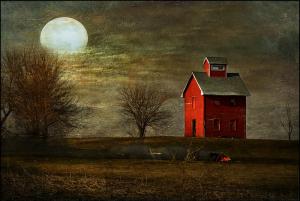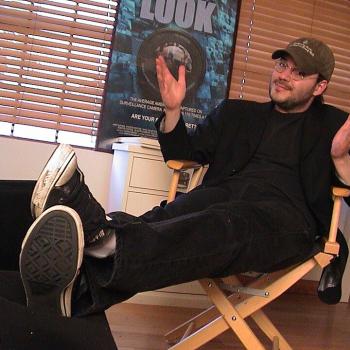
Source: Flickr User keeva999
License
At the risk of sounding like de Maistre or Kierkegaard, “genius” is a bad word in our (brace for it) leveling age (not that I don’t stand for leveling). When drafting histories of their relationships to TV, my students agreed that one quality kept them glued to the tube: relatability. Standing out through sheer force of talent (honed and trained to be sure) now often alienates. Singin’ in the Rain (1952) is a crime. How dare Donald O’Connor dance up that wall! And auteurs? Those went out with the Great Man Theory of History and gray flannel suits.
Perhaps the desire for plentiful skill has waned due to over-exposure to images, moving and still. It takes natural luck and soul-destroying years to produce a Judy Garland. Who has the time for that when there are millions of videos to be made? (Note too that genius, by definition, is a social phenomenon. Liz Taylor might have all the natural talent and beauty God can bestow, but it takes practice and cadres of friends, collaborators, and hangers-on to make perfect an auspicious start).
I’m exaggerating, sure. Relating to a character or artist is often a pathway to admiration. And yet, the similarity ends where an abundance of talent begins. “Genius” has the same root as “generate”—“to give birth to,” “to beget,” “to produce.” In its original, the term meant a personal deity or daemon and by extension the inner character bestowed by that guardian’s grace. This sense became increasingly intellectualized through the Middle Ages. And so, you get Alain de Lille’s De Planctu Naturae, in which Genius is a creation of Natura, her trump card made to channel and contain boundless human desire, Cupido. A genius, we might say, is one who captures the experience of being human in some awe-inspiring way, someone who, for a moment, provides the illusion that it all makes sense.
We shouldn’t, however, forget the daimon. While watching Matt Wolf’s Wild Combination: A Portrait of Arthur Russell (2008) you certainly cannot. At a slim 71 minutes, Wolf’s documentary offers only suggestive tableaus from the obscure musician’s strange life. Better yet, playing behind the archival photos, well-fitted dramatizations, and interviews, Russell’s multidimensional oeuvre provides the foundation. Wolf’s movie doesn’t so much introduce us to Russell as it does immerse us in his peculiar world.
Born in 1951 in Iowa, Russell came into a world so terrifyingly normal that, by our standards today, it seems impossibly bizarre. His parents, interviewed throughout, are the plain, well-spoken, and seriously, but not garishly, dressed Heartlanders who fought and won the Civil War, the kind of folks you can properly call folks. By their own admission, they didn’t know what marijuana was until they caught their son smoking it. In his song “Just Regular People,” Russell describes them with honesty and quiet respect:
My parents are regular people
They sit outside, look at the sky
Eat food, take baths
Hello and goodbye
From these humble origins—getting busted for smoking pot, surviving bullying, reading Timothy Leary at too young an age—Russell, then 18, fled to San Francisco (the scoundrel’s refuge for that generation) where he met Allen Ginsberg. Anticipating what’s to come, a vintage video of the old Beat poet recounts how Russell lived in some conman’s pseudo-Buddhist commune. The only problem was that he wouldn’t give up his cello—he’d share toothbrushes, towels, meals, whatever his wannabe cult-leader guru asked of him, but not his instrument. Banished to a closet, he would practice for hours and hours on end.
The bulk of the documentary, cut unobtrusively with a rhythm matching this or that Russell song, follows him in New York City, where he arrived in 1973. Folk music was on its way out, but not for Arthur. He loved Iowa, for all its banal viciousness, its quiet sun-drenched prairies and endless fields. He was a cornfed middle American Boomer no doubt about it. And, as much as he loved New York, Iowa never failed to emerge through his music, a languid foil to the City’s atomizing bustle. Take his apophatic folk ballad, “I Never Get Lonesome”:
I never get lonesome
Never in the day
Never do I worry
I’ve got nothing to sayI never get lonesome
Nothing to deplete
Never do get hungry
Got no mind to eat
I never get lonesome
Especially in the night when you are goneI never get lonesome
As long as a rooster crows
Dawn in New York City
Above the rows and rows and rows
Arthur wasn’t all Iowa though. As he came out as bisexual in the mid-70s, he embraced the emergence of disco, pioneered it in a way by acting as music director at the avant-garde venue The Kitchen. Here he’d program dance musicians after saxophonists after cellists after punks. As one friend tells us in the movie, somehow it all gelled. Russell’s genius allowed him to synthesize different currents in music until none could be called foundational. It was all just Arthur.
Take the acid-washed disco tune “Calling All Kids,” for example:
I will wait, wait for the sun to come and kiss me
I will wait, wait for the sun, the sun to find
The sun don’t know, it’s gonna kiss me
Calling all kids, calling all kids
I will wait for the sun
Say it, say it, the sun is smiling again
Calling all kids, calling all kids, entering binocular mode
Grown-ups are crazy, crazy, crazy, crazy
It’s delicate, funky, ethereal, and fun. You want to dance even though the vocals sound like a lost soul calling to you from the abyss’ edge. And that’s not even to mention the repetitive robot voices, literally calling out, sounding the alarm of youth. The movie doesn’t even give us that version; there, we hear the cello rendition of “Calling All Kids” (a great many of Russell’s songs exist in both acoustic and electronic forms).
Wolf’s documentary makes clear that Arthur was what I like to call a Genuine Weirdo (GW). He could not help being the way he was, so engulfed in his music that he barely ever actually released an album. Those who knew him describe his as shy, charismatic, weird, withdrawn, paranoid, fun, ambitious, and obsessive. For a period of time, he thought the Rolling Stones were stealing his ideas. He’d let his fish tank get perilously low on water just to hear the gurgling of its filter. His boyfriend once came home to the blender whirring at full speed as Arthur recorded a song. Did he forget about it? Or was the blender an essential element of the soundscape?
His final phase, embraced fervently as he died from AIDS (he would pass at only 40), has come to be called “echo music.” The name describes it probably about as well as can be done. The song/video “Terraces of Unintelligibility” captures it too, especially in its title. He sounds like a Muppet. He plays the cello in so many ways that he sounds like a full (if minimalistic) band. I cannot understand a single word Russell says. The whole thing gives the sense of quietly waiting for death. Among his best songs, “Love Is Overtaking Me” typifies this echo period, though combined with his early folk sensibilities:
Is it so different now?
Or is it just the way I feel, just the way I feel?
Love is overtaking me
And my heart pounds out your name in the night
It’s the same when I see you cry,
And it’s waking my heart up and it’s breaking my heart,
And mostly taking it over like the
Sun shines gloriously through the sky
I know it seems like we just met, oh, but it’s so different now
Is it so different now?
Is it so different now?
Is it so different now?
I confess that Wild Combination did make Russell relatable. He was proud of where he came from, loved his parents (who were indeed just regular people—you never hear about artists with normal parents whom they still respect and embrace!), and hated his own work (the only respectable position besides boundless confidence. No toxic positivity for me). Too often other’s backstories feel one-sided when I hear them: this one was the art kid who disdained their parents. That one went into business, just like their dad. That’s not me. Russell’s feelings come much closer. His parents seem like wonderful people, even if they (by their own admission) never “got” his music.
It also, however, revealed his genius. So bent on serving the Muse, he barely released a song during his lifetime. He spent his days convinced he’d be a pop star, even though his music sounds like just about nothing else on earth. He couldn’t work well with others; he died in total obscurity, only his doting (if regular) parents and his boyfriend there to care for him. And yet, he counted David Byrne, Allen Ginsburg, and Philip Glass as friends. We only have his recordings because a friend asked his partner if he could posthumously publish them. They’re still coming out.
Reviews of Wolf’s film (not that there are many) almost always remark that the writer could not imagine anyone watching the movie and not wanting to hear more of Russell’s music. My inner contrarian wishes I could disagree. I’m drawing blanks. It’s true. The documentary’s gentle pace and quiet pathos hypnotize you. And, by the end, you’ll be hard-pressed to deny that genius exists.













